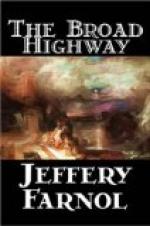“Weel, I’d hae ye tae ken I’m a braw, bonnie piper, an’ ma brither Alan, he’s a bonnie piper too—no sic a fair graund piper as me, bein’ somewhat uncertain wi’ his ‘warblers,’ ye ken, but a bonnie piper, whateffer. Aweel, mebbe a year syne, I fell in love wi’ a lassie, which wad ha’ been a’ richt if ma brither Alan hadna’ fallen in love wi’ her too, so that she, puir lassie, didna’ ken which tae tak’. ‘Donal,’ says Alan, ’can ye no love anither lassie; she can no marry the twa o’ us, that’s sure!’ ‘Then, Alan,’ says I, ‘we’ll juist play for her.’ Which I think ye’ll own was a graund idee, only the lassie couldna’ juist mak’ up her mind which o’ us piped the best. So the end of it was we agreed, ma brither Alan an’ I, to pipe oor way through England for a year, an’ the man wha came back wi’ the maist siller should wed the lassie.”
“And a very fair proposal,” said I, “but—”
“Wheest, man! juist here’s where we come to the snuff, for, look ye, every time I bought a paper o’ snuff I minded me that ma brither Alan, not takkin’ it himself, was so much siller tae the gude—an’—oh, man! it used tae grieve me sair—till, one day, I lighted on this bit hoosie.”
“Well?” said I.
“What, d’ye no see it?”
“No, indeed,” I answered.
“Eh, man! ma brither Alan doesna’ buy the snuff, but he must hae a roof tae shelter him an’ a bed tae lie in o’ nights, an’ pay for it too, ye ken, fourpence, or a bawbee, or a shillin’, as the case may be, whiles here I hae baith for the takkin’. An’, oh, man! many’s the nicht I’ve slept the sweeter for thinkin’ o’ that saxpence or shillin’ that Alan’s apartin’ wi’ for a bed little better than mine. So, wishfu’ tae keep this bit hoosie tae mysel’—seein’ ‘t was haunted as they ca’ it—I juist kep’ up the illusion on account o’ trampers, wanderin’ gypsies, an’ sic-like dirty tykes. Eh! but ’twas fair graund tae see ’em rinnin’ awa’ as if the de’il were after them, spierin’ back o’er their shoulders, an’ a’ by reason of a bit squeakie o’ the pipes, here. An’ so, sir, ye hae it.”
I now proceeded to build and relight the fire, during which the Scot drew a packet of bread and cheese from his sporran, together with a flask which, having uncorked, he held out to me with the one word, “Whuskey!”
“Thank you, Donald, but I rarely drink anything stronger than ale,” said I.
“Aweel!” said he, “if ye winna’, ye winna’, an’ there’s but a wee drappie left, tae be sure.” Whereupon, after—two or three generous gulps, he addressed himself to his bread and cheese, and I, following his example, took out the edibles Simon had provided.
“An’ ye’re minded tae bide here, ye tell me?” he inquired after a while.
“Yes,” I nodded, “but that need not interfere with you—two can live here as easily as one, and, now that I have had a good look at you, I think we might get along very well together.”
“Sir,” said he solemnly, “my race is royal—I am a Stuart—here’s a Stuart’s hand,” and he reached out his hand to me across the hearth with a gesture that was full of a reposeful dignity. Indeed, I never remember to have seen Donald anything but dignified.




